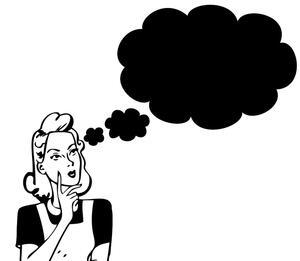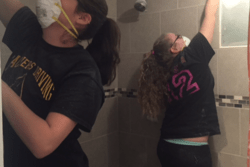Tongue-Tied
There’s pretty much only one way to make sure your opinions are heard: speaking up. While this might be the best way to get your ideas out there, it's not always easy.
As a teenage girl, I occupy many spaces in which the premise that I should speak up if I have something to say is a given: in my classes, club meetings, team-oriented extracurriculars, and even at home in family discussions. In my classes, I’m actively encouraged to speak up; in fact, I’ll be penalized if I don’t. I go to clubs to participate in discussions; that means both listening to others, and adding my own opinions to the mix. Part of working on a team is making contributions and suggestions for the good of everyone. And my parents have never even remotely discouraged me from sharing my thoughts. Yet in all of these situations, I find myself holding back, even when I have something to say.
Right before I’m about to open my mouth, a million reasons why I shouldn’t always pop into my mind. What if I haven’t properly thought out what I’m about to say? Improvising is risky; I don’t want to make a fool of myself. What if what I’m about to say doesn’t add to the discussion, or has pretty much already been stated by others? What if it’s not as relevant as it appears to be in my head? And worst of all: what if my ideas are simply wrong? And what if someone else calls me out for them?
Out of context, these questions seem pretty ridiculous. It’s clear that I’m my own worst enemy, and that I’m likely much more critical of myself than others would be. But it’s hard to remember that in the moment. If I’m going to lend my voice to a discussion, I feel like whatever I’m going to say needs to be perfectly well-thought-out, relevant, original, and correct; otherwise, in my mind, it isn’t even worth saying.
Am I just naturally more self-conscious and self-critical than most of my peers? Or are aspects of my identity shaping the way I think about my ideas and opinions? The answer is probably a combination of the two.
While I certainly know girls and women who have an easier time speaking up than I do, it’s hard to deny that gender has an impact on how I think about and voice my opinions. It's been well-documented that society conditions women to feel less confident in their achievements and abilities. This subtle sexism has far-reaching effects, including on the value (or lack thereof) that women place on their own ideas.
When it comes to expressing themselves, women often unknowingly use language that discredits their voices. I’m all too guilty of this myself; I often catch myself apologizing for my speech, or adding completely unnecessary justifications for why I’m speaking at all. I've also noticed that I’ve internalized a troubling idea: that I somehow have to represent myself well on behalf of all women. This often keeps me from speaking my mind if I lack complete confidence in my ideas. In my math and science classes, for example, I’m particularly fearful of answering a question wrong or embarrassing myself because I worry I’ll be proving the stereotypes right about women and STEM. I spend so much time making sure my potential answers are correct that I usually don’t end up raising my hand at all.
Age also plays a role in the way I think about my ideas. While people tend to take it for granted that adults’ opinions are more informed than those of younger people, this is in fact a form of ageism, or adultism. Young people often struggle to speak up around adults, especially when it comes to challenging their ideas, because they worry they’ll be shot down due to perceived inexperience or immaturity. I’ve often noticed that even the most vocal of my peers have trouble responding to teachers when they notice a mistake or disagree with something that was said. These are both important elements to class discussion, but they represent challenges to the teacher, who is not only the only adult in the room, but also the one who was given the authority to educate us. It’s a shame that it’s so hard to speak up in these situations; correcting mistakes is important in a classroom setting, and hearing different perspectives--especially from our peers--would benefit the entire class.
I hope that recognizing identity factors that sometimes hold us back and affect the way we view our ideas can help me and other teen girls to raise our voices more frequently. I know we have a hell of a lot to say, and I think the world would be better for hearing it.
This piece was written as part of JWA’s Rising Voices Fellowship.







